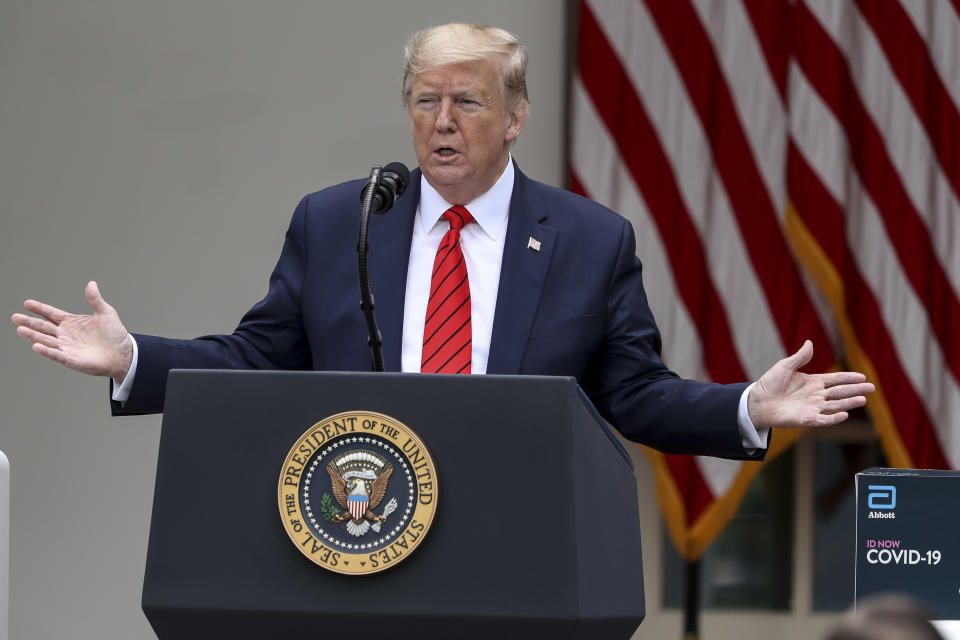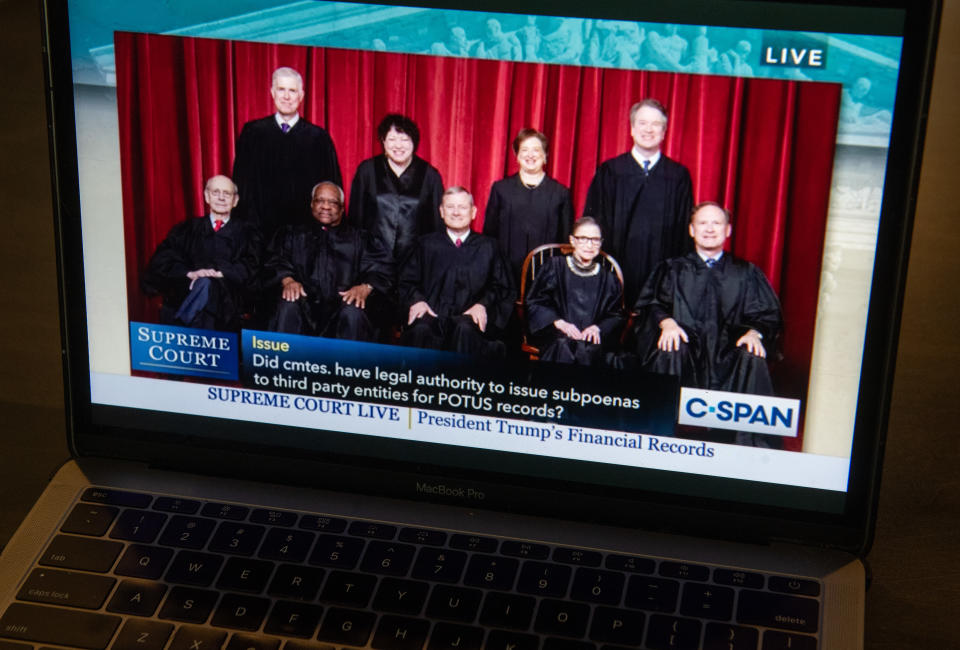Supreme Court appears split on whether Congress and prosecutors can see Trump's tax returns
The U.S. Supreme Court heard arguments Tuesday in two cases that could help decide the limits of presidential accountability and whether President Trump can continue to defy lawmakers and local prosecutors seeking to view his tax and business records.
While past decisions on presidential accountability involving Richard Nixon and Bill Clinton had unanimous outcomes, questions from the nine justices did not leave observers of the unprecedented live arguments with a clear sense of how the court might rule.
Trump’s returns have been the subject of intense speculation since the 2016 election, when he broke with long-standing tradition and became the first modern presidential candidate not to make his returns public. Since then, multiple investigators, including House Democrats, have sought the documents amid questions about Trump’s foreign business ties and potential conflicts of interest involving his real estate empire.
Along with deciding the fate of Trump’s financial secrets, the pair of Supreme Court cases have major implications for the rule of law; they will determine the investigative powers, if any, that state and local officials or Congress have over the president. It’s a question that has added urgency for those Trump critics who believe the Department of Justice has covered for the president by hastily wrapping up the Russia probe and dropping the criminal charges against Trump’s former national security adviser Michael Flynn. If the Justice Department is indeed uninterested in pursuing investigations against the Trump administration, that leaves Congress and local officials as one of the last sources of potential presidential accountability.
The first case heard by the court concerned subpoenas for financial records that committees of the House of Representatives had issued to Trump’s accounting firm, Mazars USA, and to one of his major bankers, Deutsche Bank. The second case covered a similar subpoena issued to Mazars by a grand jury empaneled for the office of Manhattan District Attorney Cyrus Vance Jr. as part of its investigation of “a potential crime” alleged to have occurred at Trump’s private business, which is headquartered in New York, in connection with the payment of hush money to women during the campaign.
Both Mazars and Deutsche Bank have said they intend to comply with a valid subpoena, and in both cases, lower courts held the subpoenas to be valid. Trump’s lawyers appealed each case all the way to the Supreme Court in the hopes of obtaining a different decision.

In both cases, advocates for the investigators pointed the ourt to its past precedents.
Douglas Letter, representing the House in the first case, cited cases in which the court found that Congress’s power to develop legislation implies a broad investigative powers. The court also instituted a rule of deference to congressional committee chairmen so long as they outlined a “legislative purpose” for their investigative activities.
In the second case, Carey Dunne, the lawyer for the Manhattan DA’s office, relied on the principle that the public has a right to “every man’s evidence” in a criminal investigation unless it is protected by some legally recognized privilege. He also pointed to the court’s more recent jurisprudence — cases involving former Presidents Nixon and Clinton — that found a president doesn’t have any absolute privilege from giving evidence to criminal or civil proceedings.
“This court has long held that American presidents are not above having to provide evidence in response to a law enforcement inquiry,” Dunne said.
In both cases, Trump’s attorneys argued the president’s unique role makes him vulnerable to partisan attacks.
“The fact that they seek personal documents doesn't mean that they're not targeting the president,” Trump attorney Patrick Strawbridge said during arguments in the case involving the House subpoenas.
“Indeed, both the Oversight Committee and the House Intelligence Committee have identified the president in his role as president as one of the motivating factors for their investigation,” Strawbridge added.

Jay Sekulow, who represented Trump in the second case involving the Manhattan district attorney’s probe, argued local prosecutors do not have authority to investigate the president.
“No county district attorney in our nation’s history has issued criminal process against a sitting president, and for good reason: The Constitution doesn’t allow it,” Sekulow said in his opening remarks.
Sekulow went on to argue that granting the Manhattan prosecutor access to Trump’s financial documents “weaponizes 2,300 local DA’s” in the country.
“The decision would allow any DA to harass, distract and interfere with a sitting president,” Sekulow said. “It subjects the president to local prejudice.”
The attorney for the Manhattan prosecutor responded that most local district prosecutors would be unlikely to have jurisdiction over the president, whose business is headquartered in New York.
Sekulow’s opening statement touched on the second major element of Trump’s attorneys defense in both cases — the idea that undue investigations could distract the president from more important work. Sekulow made this case with a hypothetical:
“I’m going to call the president of the United States today and say, ‘I know you’re handling a pandemic right now for the United States but I need to spend a couple … hours with you going over a subpoena of documents that are wanted by, here, the New York county district attorney.’”

Because of the unique concerns of partisan attacks and the presidential workload, Sekulow repeatedly argued that “the president is not to be treated as an ordinary citizen.”
He and Strawbridge also raised the specter of a flood of subpoenas from multiplying congressional committees or district attorneys all over the country. Dunne, the lawyer for the Manhattan district attorney, suggested that concern was greatly exaggerated.
“The supposed floodgates have been open for generations,” Dunne replied to that argument, “and there’s never been a flood.”
Conservative and liberal Justices found some common ground in the congressional subpoenas case, aggressively questioning Letter, the House’s general counsel, on his refusal to identify a limit on the legislative purposes the House could potentially use to justify investigation of the president.
“Could you give me a plausible example of a subject that you think is beyond any legislation that Congress could write?” Chief Justice Roberts asked early in the session.
Letter could not.
Time and again, the Justices returned to this point. In an argument that would almost inevitably focus on the separation of powers, the House’s lawyer had come to court without a proposed constraint on the type of information the legislative branch could forcibly extract from the head of the executive branch.
Carey Dunne, the Manhattan DA’s attorney, avoided that stumbling block, proposing to the Justices that his office should be permitted to impose burdens on the presidency with subpoenas for documents if it made a showing of “objective need” and of a likelihood that the subpoenas would produce relevant evidence. Sekulow and the DOJ argued in effect that no subpoenas burdening the president in any way, whether as the target of an investigation or simply as a witness, should be allowed until his term is over. Dunne countered that waiting until Trump is out of office could block legitimate prosecutions due to the statute of limitations for criminal charges.
“The clock is ticking,” Dunne said.
It was clear that the court knew its ruling could have far reaching implications. Both liberal and conservative justices explained over the course of the morning’s arguments that they were grappling with how to frame rules for Trump that could apply to future presidents as well. Nevertheless, the arguments also highlighted how Trump is a one-of-a-kind officeholder.
Unique among his predecessors, Trump came to the White House after a lifetime spent in the private sector. Other presidents placed all their investments into an independently administered blind trust; Trump chose to maintain close ties to his business empire and its attendant potential conflicts of interest through a revocable trust administered by his sons. Unlike other presidents, Trump chose to keep his tax returns and the details of his financial affairs secret.
This constellation of presidential choices, though hardly referenced in oral argument, lay at the heart of the unprecedented confrontation in the Supreme Court this morning. Dunne explained that the DA’s jurisdiction over Trump is tied to his Manhattan-based business, and that the DA had to respond to public reports of impropriety at the company, namely its role in payments made by Trump’s now incarcerated personal attorney, Michael Cohen, to adult film star Stormy Daniels.
“The subpoena … was not born of any political animus or intent to harass. Instead, it was prompted by public reports that certain business transactions in our jurisdiction were possibly illegal. Given those allegations, our office would have been remiss not to follow up in response,” Dunne said.
Because of the coronavirus pandemic, the Supreme Court has, since last week, been holding oral arguments by telephone conference, and in an unprecedented move it has opened up live audio of these conferences to the public. This gave court watchers across the nation a chance to listen in on the nine justice’s questioning for hints at how they might rule. That opportunity was particularly interesting since Trump has appointed two justices to the nation’s highest court — Neil Gorsuch and Brett Kavanaugh — and the president’s critics have suggested a scenario in which his appointees might try to shield him from legitimate legal jeopardy.
The court’s questioning in both cases revealed a panel mostly divided on ideological lines and past commitments. However, on the whole, Kavanaugh and Gorsuch didn’t stake out clear positions and instead used their time to sharpen the inquiries of other justices.
Rulings in the two cases are expected in June or July, as the presidential campaign is in full swing. The court could, however, defy that timetable by ordering further argument or holding over the cases to the next term. For his part, Dunne alluded to the statute of limitations and argued that any further delay would play into Trump’s hands and shield him from accountability.
“Frankly, we’ve already lost nine months of time in this investigation due to this lawsuit,” Dunne told the court. “And again, you know, every minute that goes by is — without even a decision on the merits here — granting the same kind of temporary absolute immunity that the president is seeking.”
_____
Click here for the latest coronavirus news and updates. According to experts, people over 60 and those who are immunocompromised continue to be the most at risk. If you have questions, please refer to the CDC’s and WHO’s resource guides.
Read more:


